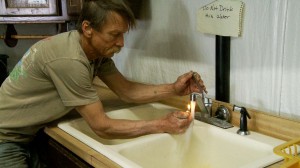
A man in a fracked community shows how gas leakage affects water tables.
“Gasland,” a documentary written and directed by Josh Fox, is the latest film from International WOW Company, a film and theater group founded by Fox that focuses on producing projects that examine current social and political concerns.
Fox, the filmmaker and protagonist, lives in the Upper Delaware River Basin, an area being targeted for natural gas exploration. When an unnamed natural gas company offers him a $100,000 contract to lease mineral rights on his 19-acre family homestead and extract the natural gas from the Marcellus Shale bed beneath his property via hydrofracking, he grabs his trusty banjo and industrial gasmask, and starts asking questions.
Fox began by investigating rumors of flammable tap water in Dimock, Pa. What he discovered there were sick citizens, polluted water and allegations of a cover-up revolving around recently hydrofracked natural gas wells. A concerned Fox asks: With the current gas exploration situation, is Dimock the exception or the rule? To answer these and other questions he embarks on a 24-state road trip exploring other communities where hydrofracked natural gas wells dot the landscape. Along the way he interviews everyone from cowboys to EPA whistleblowers.
Hydrofracking, or hydraulic fracturing, is a process to extract natural gas from shale beds using a mixture of water, sand and proprietary chemicals under high pressure to crack deep underground shale deposits, which releases natural gas. The film depicts hydrofracking as unsafe and controversial, because many of the over 500 chemicals infused into water to make fracking fluid are known carcinogens that could possibly enter ground water.
There are also allegations that fracturing the shale releases natural gas into the surrounding water table, making the water poisonous and flammable.
At few points in the film does anyone step back from the anti-fracking view and evaluate the idea that if there weren’t a pressing demand for fossil fuels by the general public then the gas companies wouldn’t be expanding and looking for more sources of natural gas. When Oklahoma congressman Dan Boren (D- Oklahoma) is shown supporting natural gas exploration because it creates jobs in his state and reduces our dependence on foreign oil and terrorism, we see Fox’s signature editing technique at work. Boren’s political position is never identified in the film, which discredits him, and as Boren speaks, the film cuts to shots of bored panelists and shots of Fox chewing gum, rolling his eyes and smirking.
The interviews with people whose lives have been impacted by hydrofracking feel genuine. The most memorable is of Colorado’s Mike Markham, the first person who Fox films lighting his tap water on fire. The way Mike treats the flames shooting out of his faucet as a commonplace occurrence is entertaining yet disconcerting.
Watching Mike hold a lighter under the running water creates a feeling of suspense. After a sizeable fireball erupts from the sink Mike exclaims, “That’s the best I’ve done,” quickly followed by, “I smell hair.” The way the interviewees are portrayed casts them as victims of exploitation by greedy corporations. The film never explores how the hydrofracked wells came to be on the property of these victims. Did the company offer them lucrative contracts similar to Fox’s?
The film outlines the potential for disaster if a hydrofracking accident occurred in the Upper Hudson region of New York, the source of the states tap water. Hydrofracking could also come to the Rochester area.
Preliminary exploration has already begun in Wayne and other surrounding counties. Beneath upstate New York lies the Marcellus Shale, a deposit so big it has been called, “the Saudi Arabia of Natural Gas.” Rochester gets most of its water from Hemlock and Canadice Lake, and if a hydrofracking accident were to occur near one of them it would raise serious questions about the continued safety of our water supply.
Despite its narrow point of view, has “Gasland” been effective at creating change? Yes. Since the film won the Sundance Film Festival’s U.S. Documentary Special Jury Prize in January 2010, activist groups have been growing in number around the country, and more people are taking notice of the issue.
On Nov. 30, 2010, the New York Assembly passed a hydrofracking moratorium that prevents the issuance of new permits for hydraulic fracturing until May 15, 2011, in order to give the DEC enough time to conduct a review of the process. The DEC claims that they will be done with their investigation in early June. I highly recommend watching “Gasland.” It is a well-crafted film that draws attention to an important issue for Rochester, New York State, and America.
On Tuesday, March 1, there will be a showing of “Gasland” at the First Unitarian Church at 7 p.m., followed by a group discussion. On Sunday, March 13, Interfaith IMPACT of New York State, a program dedicated to creating informed citizens, is presenting “Hydrofracking in New York State?” at Temple B’rith Kodesh at 2 p.m.
Done is a member of the class of 2013.





